

Hodgkin Lymphoma cancer is a cancer of the lymphatic system of the body. The disease is named after Dr. Thomas Hodgkin who described this disease in 1832 and named it Hodgkin’s disease, until later in the 20th century it was changed to Hodgkin’s lymphoma. HL affects the immune system of the body, however, it is the most curable type of cancer. To understand the hodgkin's lymphoma disease better, let's understand what is the lymphatic system first. Our body’s lymphatic system (also known as a lymph system) is a part of the immune system of the body. It protects our body by fighting against infections and other foreign particles/microorganisms. It also controls the flow of the fluids in the body. Lymphomas are the type of cancer that starts in the WBCs (White Blood Cells) which are also known as lymphocytes. They are of two types 1) Hodgkin lymphoma (HL) and 2) Non-Hodgkin lymphoma (NHL). HL has an excellent cure rate if it is diagnosed and treated at an early stage. But if the diagnosis is delayed, the treatment is also delayed and hence it becomes severe.
In sub-Saharan Africa, most of the patients of hodgkin's lymphoma cancer have delayed diagnosis and treatment due to a lack of access to health care, a shortage of health care providers, and limited diagnostic tools. The hodgkin's lymphoma disease is more common in African children. Despite the high survival rates in high-income countries, African countries are facing many challenges in curing this disease. The recommended hodgkin's lymphoma treatments for children is a combination of chemotherapy and radiotherapy. However, many sub-Saharan African countries use only chemotherapy due to the lack of radiotherapy services. About 25 sub-Saharan African countries don’t have enough radiotherapy machines. The studies show that in countries like Ethiopia and Nigeria, about 5 million patients rely on only 1 radiotherapy machine. In addition to that, in some countries like Cameroon and Madagascar, there is a decline in radiotherapy treatment.
Every year, so many cancer patients from around the world are traveling to India for the right diagnosis and treatment. About 600,000 global patients travel to India every year for advanced medical care for different medical conditions such as cancer, cardiac, organ transplant, orthopedic, IVF, etc. This is because India is providing world-class treatment at a fraction of the treatment cost in the developed countries. India has highly advanced healthcare technology with world-class quality standards. India has highly experienced Hodgkin Lymphoma doctors who have gained the trust of a lot of international patients due to highly supportive and premium medical service. In addition to this, the government of India is providing a streamlined medical visa process for international patients to provide early diagnostic and services for hodgkin's lymphoma cancer treatment in India.

There are two types of hodgkin's lymphoma which are further divided into subtypes. The major types of the HL are Classic Hodgkin’s Lymphoma and the Nodular Lymphocytic Predominant Hodgkin’s Lymphoma (NLPHL). They are differentiated on the basis of the presence of Reed-Sternberg cells (these are the large cells containing more than 1 nucleus) The details about them are mentioned below.
It is the most common type of hodgkin's lymphoma cancer, that is diagnosed in the patients. It accounts for about 95% of cases of HL. The people having a classic hodgkin's lymphoma disease have a small number of Reed-Sternberg cells that are surrounded by normal immune cells. The classic HL is further divided into 4 subtypes. These are:
It is a rare type of HL that grows slowly as compared to the classic HL. It accounts for only about 5% of cases of HL and is more common in males (about 3 times more common) as compared to females. In the NLPHL, when the abnormal cells are visualized under a microscope, they look like popcorn and hence they are known as popcorn cells. They are large and variants of Reed-Sternberg cells of the classic HL.
The exact cause of a hodgkin's lymphoma disease is unknown. However, it occurs when the body starts producing abnormal amount of leukocytes (WBCs). DNA is an important component of the cell which is responsible for the structure and function of the cells in the body and hence the overall structure and function of our body. The DNA has the information that tells the cells how much to grow and how to function, but when there is an alteration or a change (known as mutation) in the DNA, it makes the WBCs grow and function abnormally. This is what causes a cancer (tumor). These changes in the DNA can be present at birth or you may develop these changes later in life.

These changes (mutation) in the genetic material (DNA) can be caused by a variety of factors which include your age, gender, family history (heredity), any previously done major surgery like an organ transplant, certain viral infections in the body such as an HIV, etc. Normally, the cells have a limited lifespan (they are mortal) and they die after serving their role in the body. But when there is a mutation in the DNA of the cell, it causes the cells to multiply/grow rapidly and they don’t die either (become immortal). In addition to this, they also attract healthy/normal cells to protect them by surrounding them so that they can grow safely. This forms a crowd of the normal and abnormal cells in the lymph nodes which causes inflammation or swelling.
The most common and visible symptom of Hodgkin’s Lymphoma disease is the swelling in the lymph nodes present in different parts of the body such as the armpit, groin, neck, etc. This swelling does not cause any pain however, some people may experience a little pain at the swelling site. The swelling is caused due to the crowd of the abnormal lymphocytes (WBCs) and the normal lymphocytes and forms pea-sized lumps. You may have some symptoms other than swelling depending on the location of the swelled (enlarged) lymph nodes in the body. For example, if the affected area is the abdomen, you will experience indigestion or abdominal pain. The other symptoms of the hodgkin's lymphoma disease include fever, breathlessness, fatigue, persistent coughing, unexplained weight loss, itching on the skin, infection, bleeding, appearance of blood spots under the skin, heavy periods, night sweats, chest pain, etc.

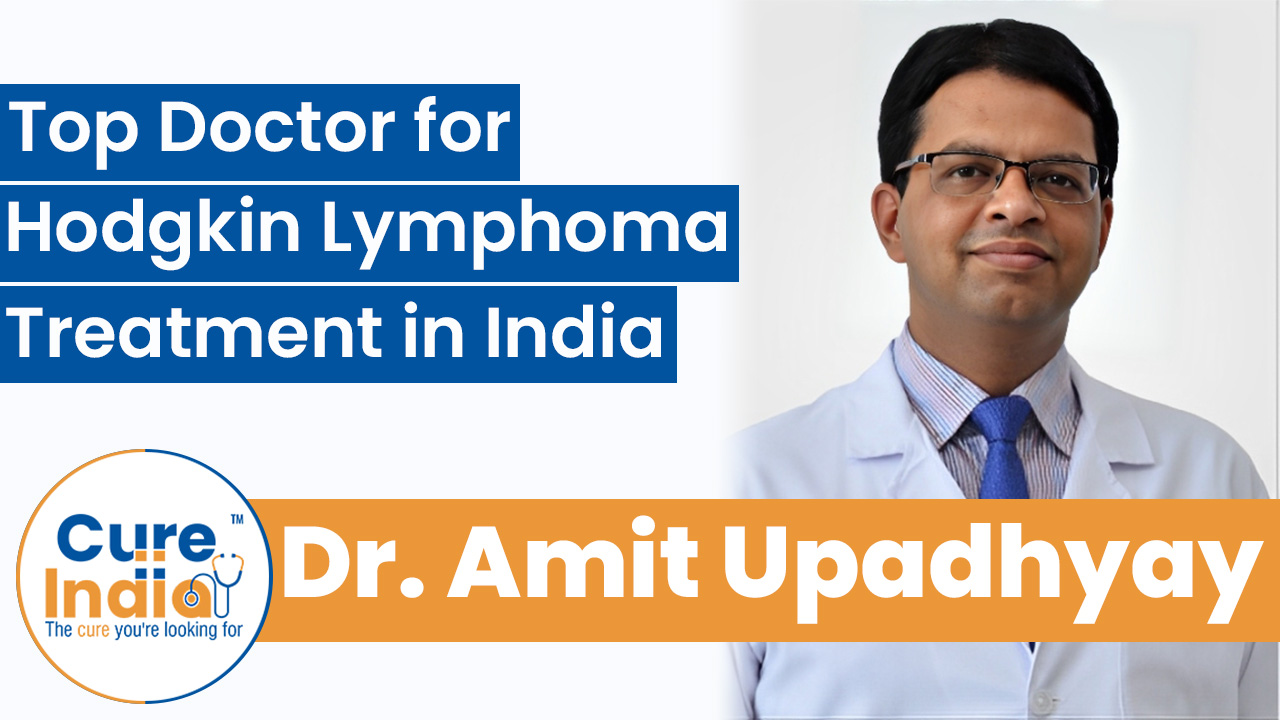
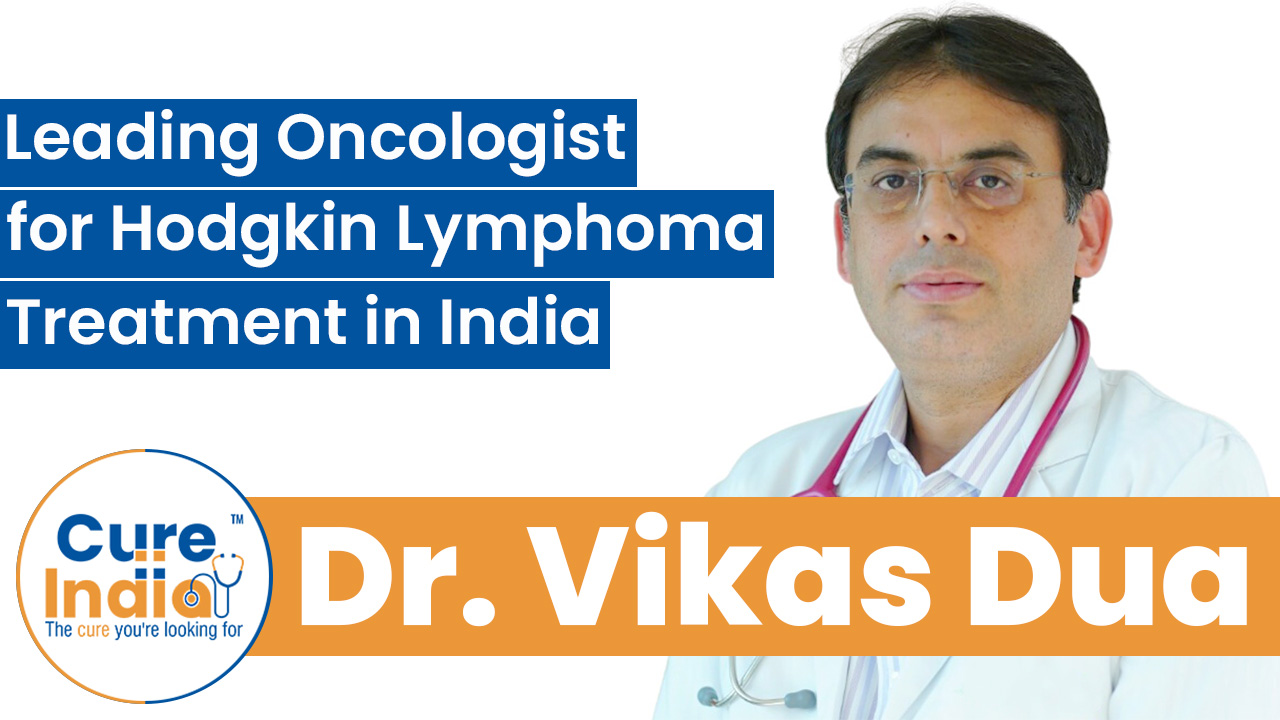
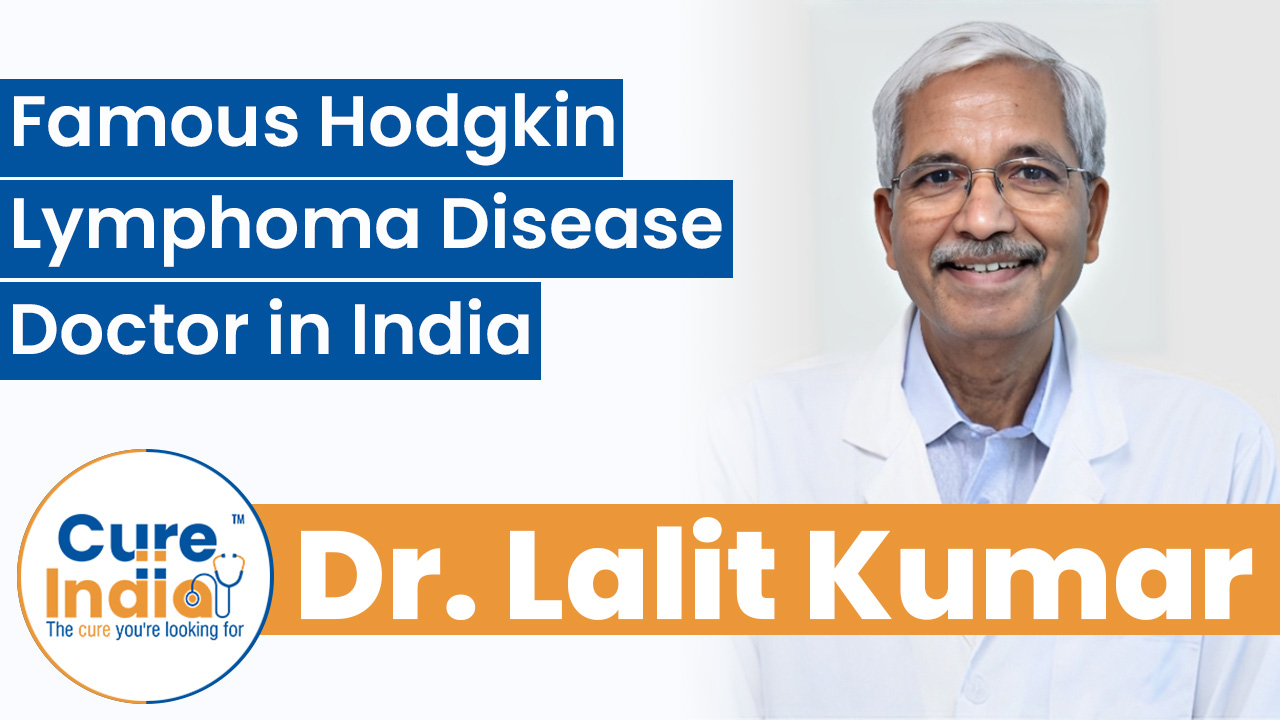
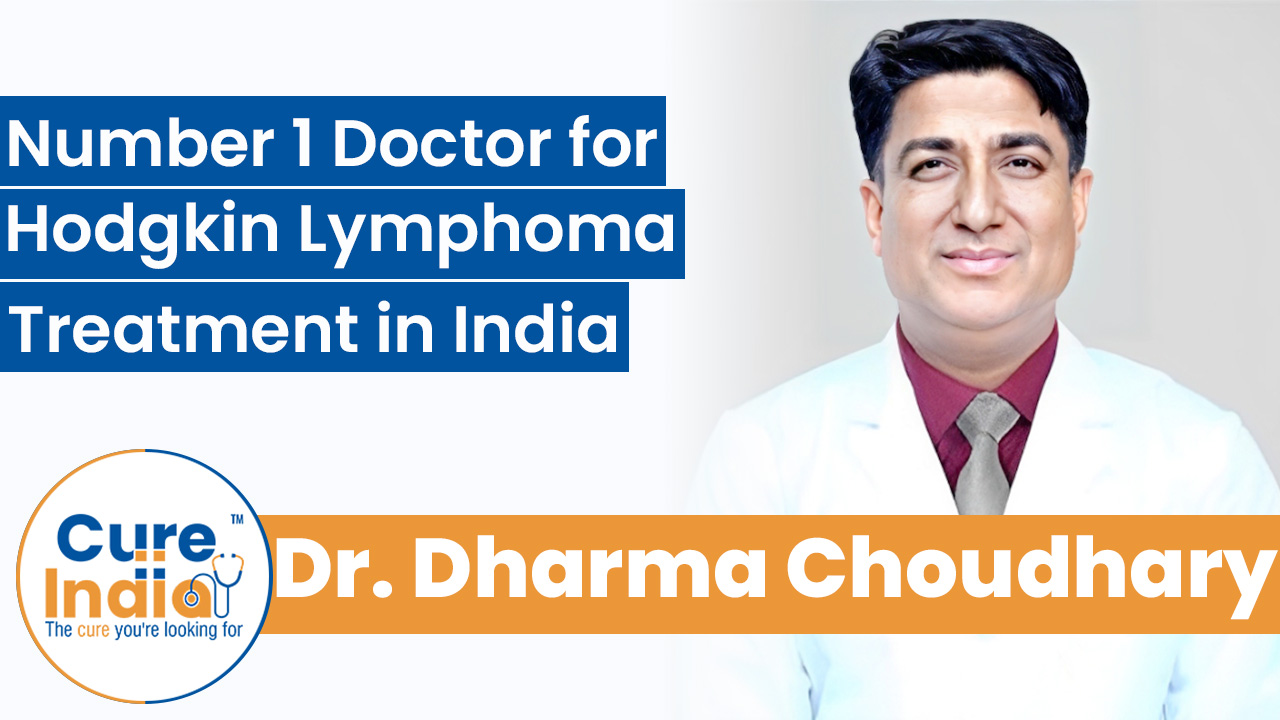
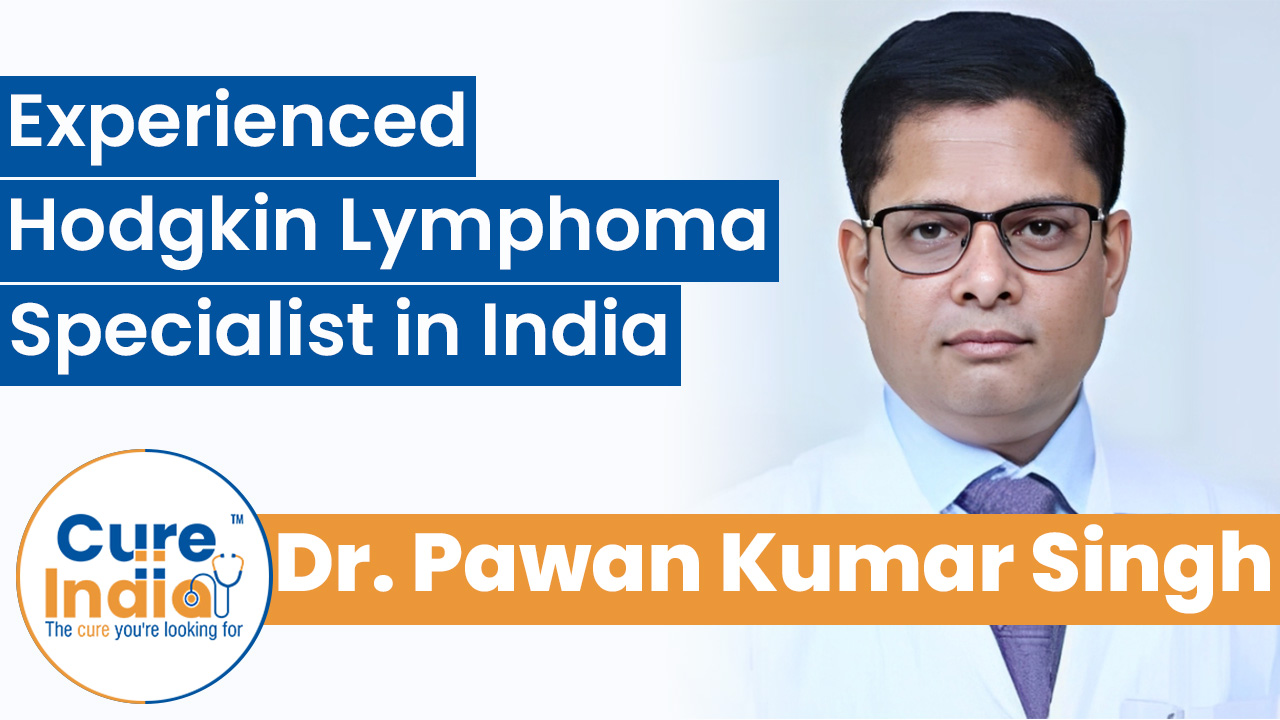
A lot of people from African nations like Tanzania, Kenya, and Nigeria visit India for Hodgkin lymphoma treatment. Indian hospitals for Hodgkin's disease treatment have the best doctors and are equipped with the best treatment procedures. The doctors are highly experienced and skillful in India with international degrees and practical knowledge of different treatment procedures. India provides Hodgkin's disease treatments like bone marrow transplants, radiation therapy, chemotherapy, etc., for the treatment of Hodgkin's lymphoma disease. Hodgkin's lymphoma cancer treatment in India is cheaper than the rest of the world. The cost of Hodgkin's Lymphoma treatments in India is provided below.
| Treatment | Cost in India | Stay in India |
|---|---|---|
| Hodgkin's Lymphoma Cancer Treatment in India | $500 - $700 Per Cycle | 1-2 Months |
The diagnosis of the Hodgkin's lymphoma disease is done by doing certain tests like blood tests, imaging tests, etc. First, your doctor will ask about the symptoms that you are having like fever, weight loss, etc. Then he may recommend you for some diagnostic tests which are mentioned below.
The blood test is important because your doctor can evaluate your overall health by the blood test. It also shows the presence of any microorganism like the virus that can be linked to HL disease. The blood test includes the complete blood count (CBC report), blood chemistry study, erythrocyte sedimentation rate (ESR), etc. These tests help evaluate the number and condition of the blood cells in your blood, certain components that the tissues or the organs release in the bloodstream, and the rate of sedimentation of the RBCs (erythrocytes). The sedimentation test tells us about an infection in the body.
The main aim of the imaging tests is to check whether the cancer has spread to the other body parts or not. These tests include X-rays, CT Scans, MRI Scans, PET Scans, Ultrasound, etc. An X-ray of the chest to determine the spread of cancer in the lungs or anywhere in the chest, a Computerized Tomography Scan to see the 3D image of the internal parts of the body, Magnetic Resonance Imaging Scan to see the detailed image of particular areas of the body, an Ultrasound to create a sonogram of the different organs of the body, and Positron Emission Tomography Scan to check the spread of cancer and the activity of cells in the different areas of the body.
It is an important diagnostic test that requires a tissue sample of the affected area such as a liver, lung, spleen, etc. to visualize under the microscope. In this test, the presence of abnormal cells like the Reed-Sternberg cells and the popcorn cells are checked. A bone marrow biopsy is also performed to see whether the cancer has spread to the bone marrow.
The goal of hodgkin's lymphoma treatments is to attach the cancer cells and destroy them. Depending upon the type and stage of the cancer you have, your oncologist will recommend the best treatment for you. There are various options for Hodgkin's lymphoma cancer treatment in India. They are listed below.

This is a type of drug treatment that is used to destroy the cancer cells throughout the body. It can be given orally or intravenously. What these drugs do is it spread in the entire body and kill the cancer cells. For classic HL, the chemotherapy is often combined with the radiotherapy, and for the nodular lymphocyte predominant HL, the chemotherapy is often combined with the targeted therapy and the radiotherapy.
It is also known as radiotherapy which uses a high energy such as X-rays to destroy the cancer cells. For the hodgkin's disease treatment, radiation is applied to the lymph nodes at the affected area and the surrounding tissues where the cancer might have spread. Many times, the radiotherapy is combined with the chemotherapy.
This is also a drug therapy that uses medicines that only target the cancer cells. These drugs are designed in a way that identifies certain chemicals that are specific and only present in the cancer cells (the normal cells don’t have these chemicals) and then destroy the cells that show their presence. Many times the targeted therapy is combined with chemotherapy.
Our immune system attacks the abnormal presence in the body such as cancer cells. But the cancer cells protect themselves by hiding from the immune cells. What immunotherapy does is, make our immune cells capable of finding the cancer cells and then destroying the cancer cells.
It is also known as bone marrow transplantation. It is a surgical procedure that is done to replace the diseased bone marrow with a healthy one. You might need a donor or you can use your own stem cells that will help you grow the healthy and new bone marrow. Stem cell transplantation is mostly done in combination with chemotherapy or radiation therapy. In this procedure, first, your stem cells are extracted from your body and preserved, then chemotherapy or radiation therapy is given to kill the cancer cells, and then the fresh stem cells are administered in your body which will grow a healthy bone marrow.
Once you have received the treatment for the Hodgkin's lymphoma disease, it is important to follow good lifestyle habits to eliminate the chance of reoccurrence of cancer. You will have regular appointments to keep track of your overall health, manage any other complications in the body, and check that the cancer has not reoccurred. For this, you will have about 3 to 4 appointments a year for a few years. Along with that, your doctor will give you some lifestyle advice to follow like eating a nutritious and balanced diet which will improve your immune system, and getting enough and regular exercise which will help you manage the stress and also strengthen the immune system, taking proper rest and sleep which will help your body to recover and manage the stress hormones, maintaining your stress which will help you stay calm and focused on your health, etc. You will be able to live a normal life after the treatment so you should not worry if you are diagnosed with Hodgkin’s lymphoma disease.
Although Hodgkin’s Lymphoma disease is the most curable form of cancer, a lot of low and middle-income countries are lagging behind in providing the correct diagnostic and therapeutic services. Due to this reason, a lot of people travel to other countries seeking the correct diagnosis and the right treatment. The Indian healthcare system provides high-quality treatments and accurate diagnoses for hogkin's lymphoma patients. With the rising cases of Hodgkin's lymphoma cancer, cost-effective treatment options are in high demand around the world and hence India is the perfect destination for international patients who are seeking world-class medical care at an affordable cost. The combination of premium healthcare service, state-of-the-art medical infrastructure, and highly skilled healthcare professionals make India the best country for hodgkin's disease treatment.
